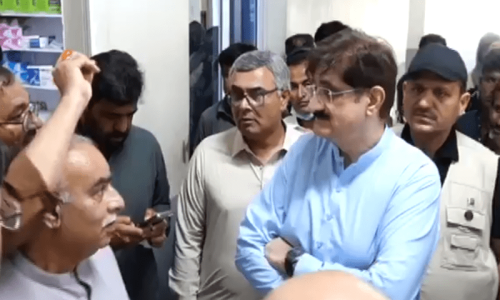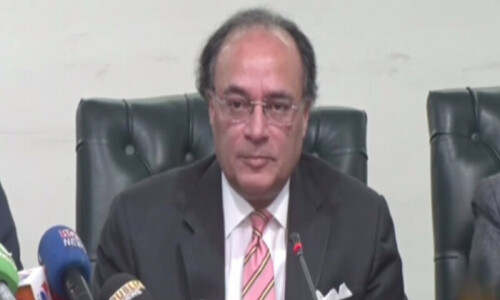Pakistan's Permanent Indus Waters Commissioner Syed Jamaat Ali Shah told Dawn that Chenab river flows on the Pakistani side were recorded at 6,213 cusecs on Wednesday. The last ten-year average flows stood at about 10,000-11,000 cusecs. He said that the flows this year were better only than about 5,000 cusecs recorded in the 2002-03 dry year. He said Pakistan had asked India to proportionately reduce their water use on its side when river water declined abnormally. He said that unusually lower rainfall this year mainly because of El Nino effect had significantly contributed to reduced water flows, apart from reportedly unauthorised water uses and construction of hydropower projects on the Indian side. He said the prevailing weather system indicated another dry year. Mr Shah said Pakistan had also asked India to provide details of its agricultural acreage, crops and other projects to enable it to make plans in advance.
He said India was irrigating about 800,000 acres in Chenab area against 1,345,000 acres permissible under the 1960 Indus Waters Treaty.
Arshad H. Abbasi, a visiting fellow at the Sustainable Development Policy Institute (SDPI), said that an exponential decline in flows had been observed at Head-Marala in Pakistan because of a reduction in monsoon rainfall in the watershed of Chenab, unauthorised direct water withdrawal by farmers in Jammu with the support of Indian authorities who had especially subsidised electricity for direct pumping in Jammu and Himachal Pradesh and diversion of Ravi-Tavi link canal.
He said that India used to irrigate 642,000 acres from western rivers by Ranbir and Pratap canals when the treaty became effective, but it had built five more canals over the past 10 years to increase the irrigated area. These include Kashmir canal system, high canal system in Jammu, Ravi-Tavi link irrigation system, Igo-phey canal in Leh and Kurbathang canal in Kargil.
Mr Abbasi said that water flows at Head-Marala had declined by almost 50 per cent in 2008-09 when compared with the historic data available since 1922.
He said that India was developing more than a dozen hydropower projects and dams over Chenab to generate 8,696MW of electricity.
The projects, he added, had tremendously decreased the river flow, but the Ministry of Water and Power contested only Baglihar dam and lost the case before the international arbitrator on technical grounds.
Mr Abbasi regretted that Baglihar was a large dam according to International Commission of Large Dam definitions, but its design was not examined on seismic point of view. After the construction, he added, Indian geological experts had pointed out that the dam was built on Murree-Jhelum faulty lines and could cause a catastrophe for downstream areas, including Pakistan, in case of a tremor.
He said a detailed investigation was needed to determine why the authorities concerned in Pakistan had so far failed to protest the construction by India of Dulhasti, Dugar, Gondhala, Reoli/Dugli, Sach-Khas, Tandi, Teling Tinget, Sawalkot, Seli, Raoli and Kirthal hydropower projects.
Mr Abbasi said India was justifying the decline in river flows on the wrong premise of climate change, although India itself was responsible for causing the melting of Himalayan glaciers through unnecessary military presence and massive deforestation in Kashmir and Himachal Pradesh regions and adding to the effects of the climate change.












































